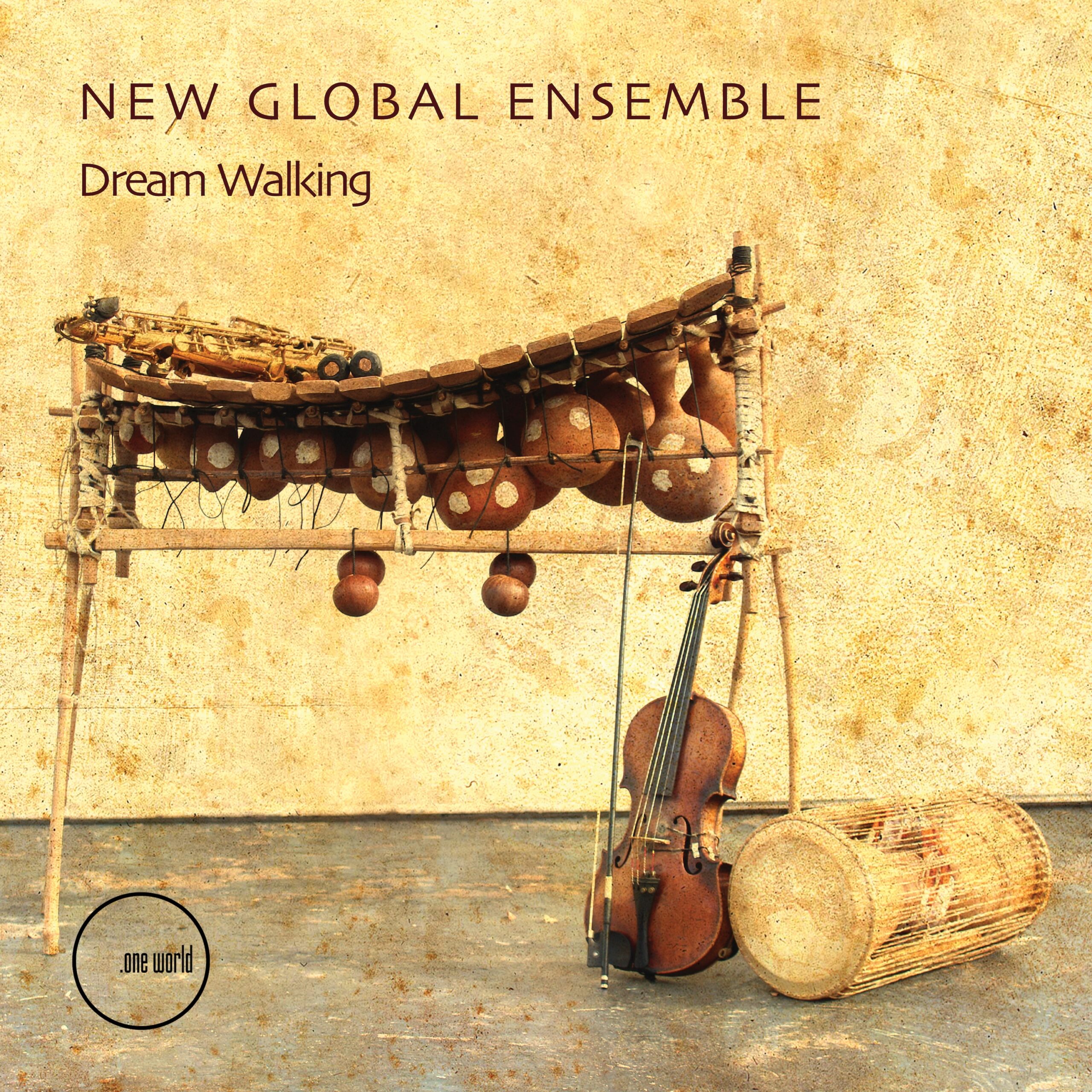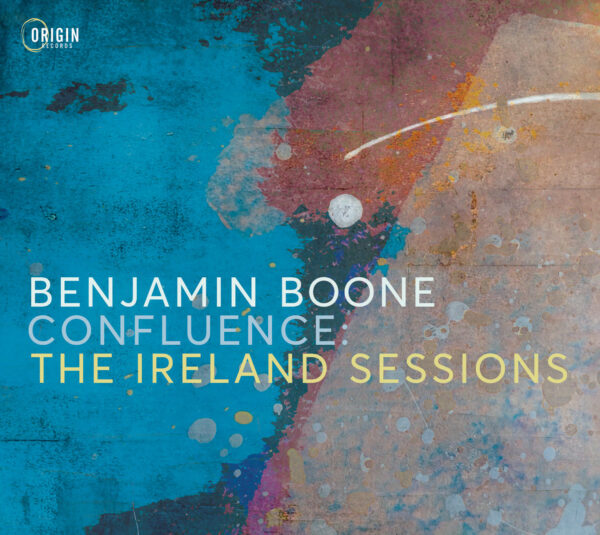Description

LINER NOTES
It’s hard to think of anything more important these days than remembering that we are all one human race, a reminder given to us in stunning fashion on Dream Walking, the debut album of the New Global Ensemble. Sprouted from saxophonist Benjamin Boone’s Fulbright fellowships in Ghana and Ireland, Dream Walking manages, through the emotional depth of its performers, to raise the questions we are all asking: Why am I here? What is my purpose? How can we unite, rather than divide?
Dream Walking combines the talents of six musicians from the United States, Germany, Ghana, Mexico, and Ireland into a cohesive whole. Saxophonist Benjamin Boone and violinist/violist Stefan Poetzsch, who have collaborated as a duo for over 30 years, surrender any need for primacy to the overall goal: creating fascinating and uplifting soundscapes with a surprising collection of instruments that includes gyil (marimba), mbira, prempensua (two different lammellophones), asalato (two shakers connected by a string), live electronics, voice, electric guitar, and many others. This mélange of electronic and electric and acoustic has the effect of both grounding the album here on Earth and sending it soaring into the stars, or even into dreams.
The entire album is intended to be heard as a multi-movement composition. “Each track has a story and feeling that naturally flows into the next. Sounds from different times and traditions all mix from one track to the other, and also blend within tracks. For example, Óscar Mascareñas’ singing is sonically like Irish chant music, or even the sound of Baroque singing, and we recontextualize it by having him sing over modern sounds like pulsating processed guitar loops, processed violin, and jazz-influenced saxophone,” says Poetzsch.
“The creation of each tune was a personal and musical journey for each of us. We had to let go of our egos, and just listen and be open to discovering each other. We had to just be,” adds Boone. “In composing each tune, we agreed on a basic framework, sound, form, or emotion, and then we relied on our empathy, compassion, and intuition as we travelled into what felt like a dreamscape.”
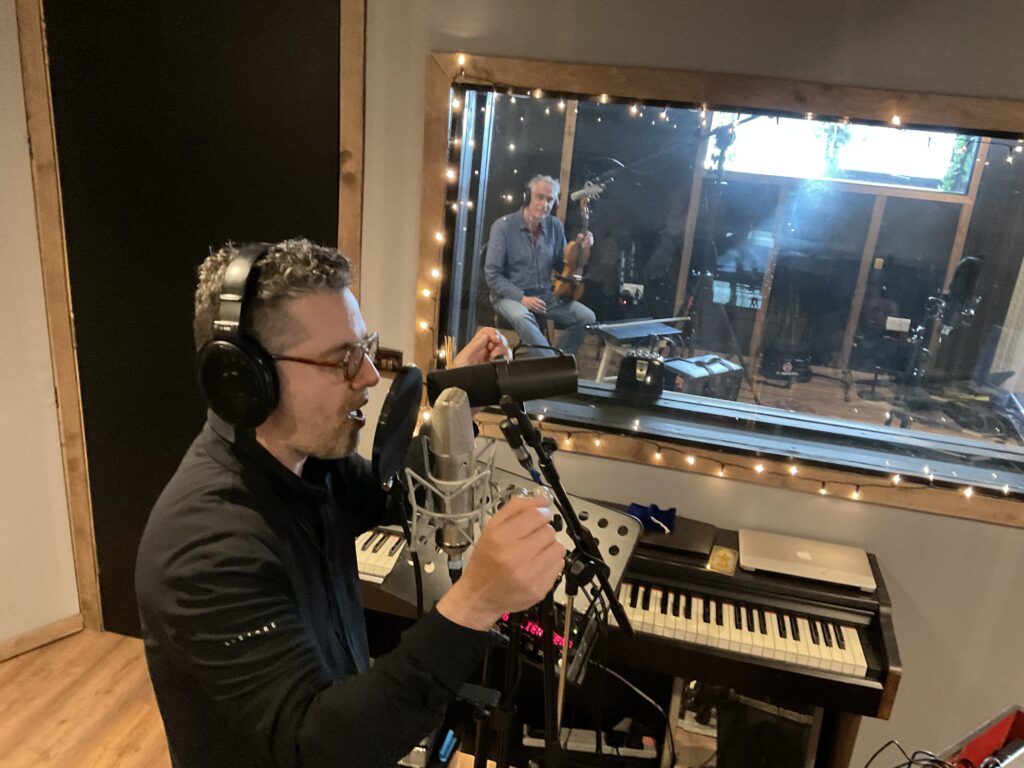
(1) “Invocation” encapsulates this sense of evocative sonic journey, with a drone-like processed guitar pad and acoustic violin providing the foundation for a soaring vocal melody, roughly based on ancient Irish chant. “My cue to the band was for Óscar to sound like he was singing an Irish chant, but in a modern context, and without using real words,” says Boone. “Tony was asked to play a slow-moving expansive modern sounding pad and Stefan short melodies and accompaniment figures. I sat this one out so that the sax appearance at the start of the next track would provide a contrast.”
(2) “Splashes and Waves” was assembled from sections of unused tracks for the premiere of a choreography by Bettina Essaka at the International Society for Contemporary Music Festival in Johannesburg, 2023. Baffour and Boone were unable to participate, so Poetzsch assembled this track for use together with live musicians there. One of the most sonically interesting elements of this track is the unique percussive sound of the prempensua, a large wooden lamellophone with wood lamellae (tines), which has several long solos. The gyil (Ghanaian xylophone), violin and alto and soprano saxophones sporadically introduce new colors and textures.
3. “Irish Incantation” returns the listener to the sound-world of track one, but with unique differences: The voice is now more exposed, meditative, and intimate, as if the singer is near the listener. The violin now adopts a more classical attitude as the saxophone directs the interplay with lugubriously mournful lines.
4. “Global Interlude” was one of the first songs the group composed while in Ghana in 2018. “It’s one of the first we recorded at Vivivi Studios in Accra,” says Boone. “Getting the computer to run Protools, finding appropriate sound baffles, working around power outages, and getting a clean sound were all challenging, so when things were finally in place and working, we were thrilled to finally create, explore, and make music together. That energy comes across on this track from the downbeat. I love the interplay on this track.”
5. “Variation on a Ghanaian Theme” came to the group through singer, percussionist, and University of Ghana lecturer Baffour Awuah Kyeremateng, who died suddenly in 2021. “He sang a traditional piece for us in 2018 at a casual get-together, partly to show off his skills with the shakers, which is incredible,” says Poetzsch. “We were in awe and invited him to a studio session. He begins the piece by singing and playing the shakers, then I come in with some processed violin sounds.” Boone adds, “we decided to recontextualize the traditional melody, with Stefan blending in modern sounds and me adding some jazzy lines. I love how Baffour did this track, and I especially love his last yell at the end! So alive!” This is the only piece on the album with actual lyrics, and they are in the West African language of Twi. The tune describes the struggles one has in life. Loosely translated, it says: “I can neither go forward nor backward. Who is doing this to me?”
6. “The Parting Glass” is a traditional Irish (some say Scottish) song that Sir Walter Scott, in the 1600s, attributed to a man who wrote it as a farewell before being hanged. The music has been used for other songs, most notably the fiddle tune, “The Peacock.” It’s been recorded by the likes of Sinéad O’Connor, Ed Sheeran, Hozier, and Phoebe Bridgers, among many others. In essence, the tune is a farewell to those who have died, or a farewell given by a person who will soon die. It expresses sorrow for leaving, but also joy for the company they shared, and the custom of sharing a final drink, a “parting glass” or “stirrup cup.” A lyric that serves as pseudo-refrain is “Good night and joy be to you all.” “This piece is haunting both musically and topically,” says Boone. “It’s normally played over a drone, so I thought it would be interesting instead to create a rich modern drone-like sound that then moves around gradually instead of staying the same – similar to that in track one. I wanted an intimate atmosphere that gives space for the listener to consider loss and gratitude. Stefan chose to play viola on this track, a brilliant decision, because that lower sound adds profundity and gravity to my melody, giving it greater emotional depth.”
7. “Convergence” begins with a pulsating guitar which is quickly joined by the violin playing minimalistically. “Our idea was to do simple related gestures – to be us – but have all of these small independent ideas converge into something unique and interesting,” said Boone. “The work develops as it progresses. It’s like each of us is adding spice to the pot, changing the flavor slightly until it turns into a great communal meal.”
8. “Friday Afternoon in Accra” is one of the first and the most frequently performed tunes by the ensemble. Its structure mirrors the exploration of styles that occurred at the ensemble’s first rehearsal in Accra, where they worked on how to integrate traditional Ghanaian, American jazz, and Western New Music idioms into something new. The piece begins with an extended gyil solo, followed by a violin solo, and finally by the saxophone entering on a jazzy melody. What follows is an exploration and expansion. “The question was: after playing this fun, groovy and clear first half, can we leave it and introduce some experimental elements, and then come back to it?” says Boone. “I hope people hear the interplay between overlapping rhythms and whipping sounds and melodies,” Poetzsch adds. “What is fascinating and impressive to me is Aaron’s ability to continue to do traditional Ghanaian gestures, but alter them so that they fit what Ben and I are doing even when we get more experimental in the second half. Amazing.”
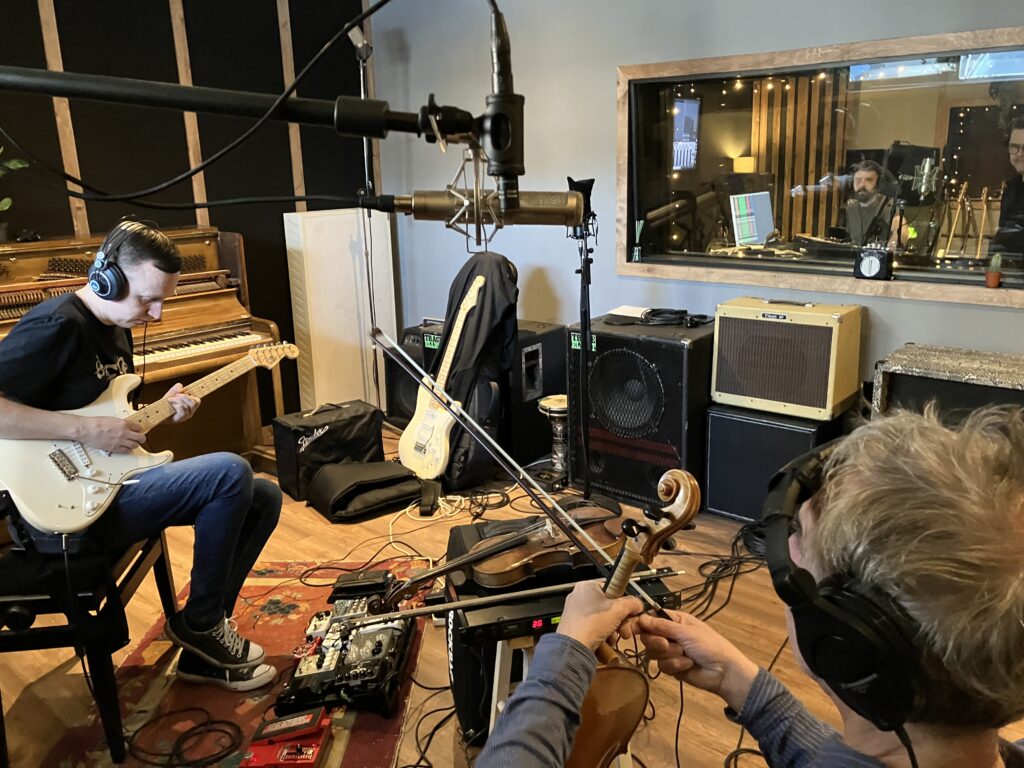
9. “Exultation” encapsulates the essence of what Dream Walking seeks to be: an evocative sonic journey. “I love this track,” says Boone. “To me, it feels like you are confronted with life and while recognizing its challenges choose to focus on the positive – to move beyond. It transports me. What Óscar’s voice does over Tony’s rhythmically driving processed guitar loop makes me feel that way. I like how the sax acts as a second voice, too. Stefan’s glue-like connection between the sax and voice makes everything work and allows Óscar to soar. I’m uplifted when I hear this track.”
10. “Dream Walking,” the title track, evokes a trance-like dream state through the slightly shifting rhythms of the asalato and mbira as the saxophone intertwines with the violin. The extremely close recording of the asalato brings the listener right into the room with the musicians, an almost tactile auditory experience. As is true throughout Dream Walking, this is the ultimate expression of listening, of musicians so tied together as an ensemble that musical ideas pass from one to another effortlessly.
11. “Exploration” was assembled from a long duo improvisation Poetzsch and Boone recorded in Ireland. The track was quite long and explored a plethora of musical ideas, so it was decided to edit it down into a short montage that symbolizes the beginning of their 30-year musical brotherhood as a duo. A brief gyil tremolo was added at the end to represent expansion into new dimensions as an ensemble with the addition of Aaron, Baffour, Óscar, and Anthony.
12. “Realization” returns us to a mystical soundscape – this time more expansive emotionally than before. “I gave the group a simple cue for this track – to use pitch glides and extended techniques that engender the feeling of being in a metaphoric fog at the beginning, with some moments of clarity – light poking through – later,” said Boone. “The use of timbral vocal sounds and the deeper viola give the track a sense of depth and import. It makes me think and ponder all that life is, which is sometimes confusion and pain. But there is also beauty, and you hear that entering halfway through in Stefan’s gorgeous lines, then in Óscar’s soaring voice. A great way to end a dream walk!”
And finally, after all of the descriptions above, it seems worthwhile at this point to mention fun. Yes, the album plumbs emotional depths and carries the listener skyward, but much of it is also ebullient and rhythmic and, well, fun to listen to. To paraphrase American poet Walt Whitman, Dream Walking is large, it contains multitudes. And as much as introspection and inspiration are key to the human experience, so are laughter and dancing and communal joy. And all of those are here.
The proof is in the pudding, or the soda bread, or the brukina, or the flan: Dream Walking is an important album for both musicians and listeners alike.
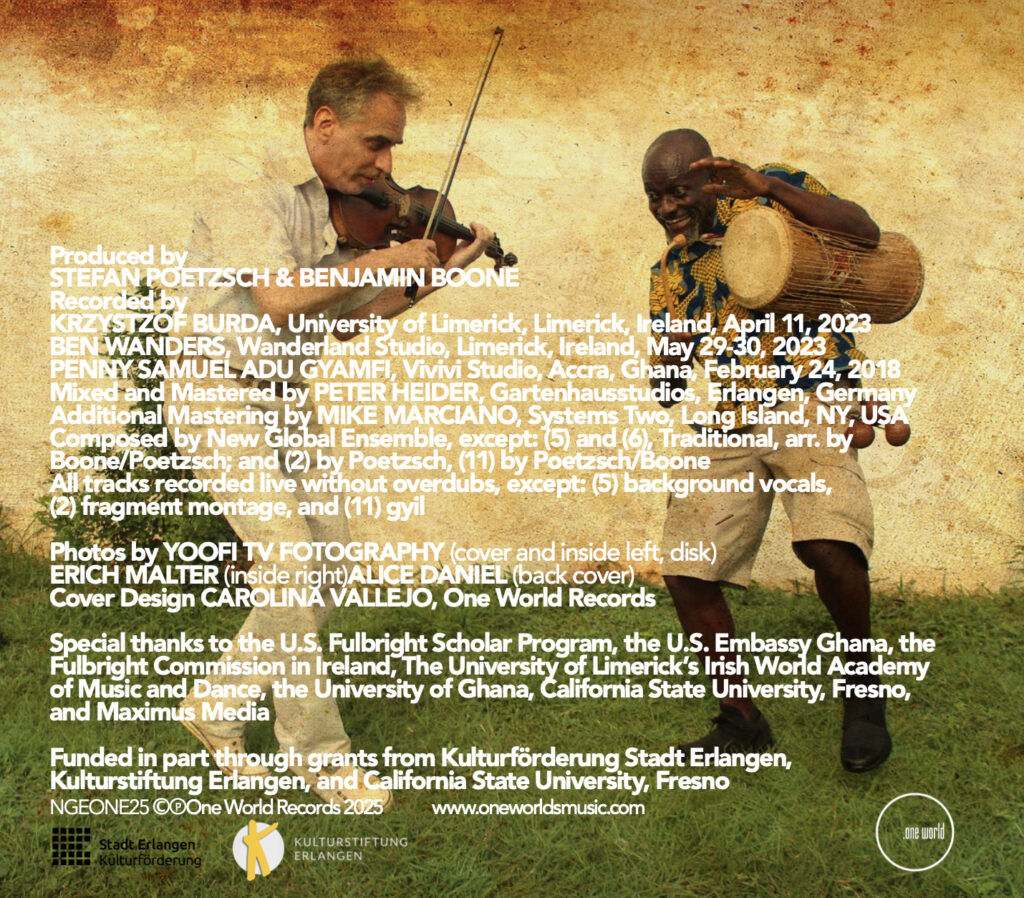
~Jason Crane, Benjamin Boone, Stefan Poetzsch
